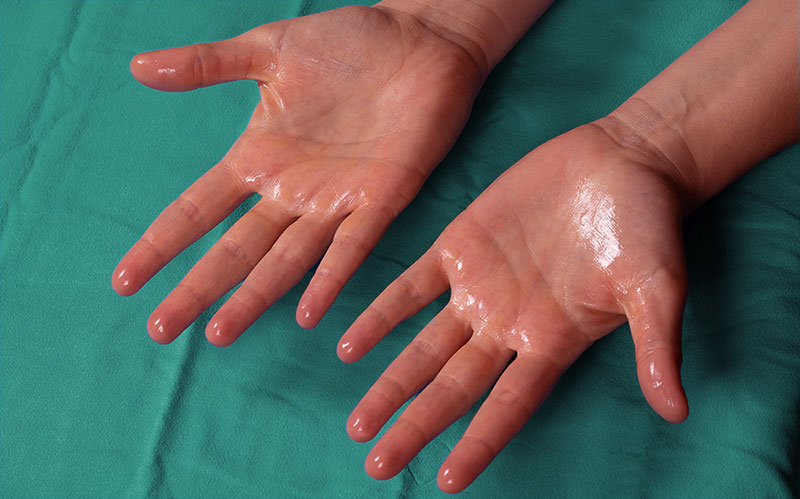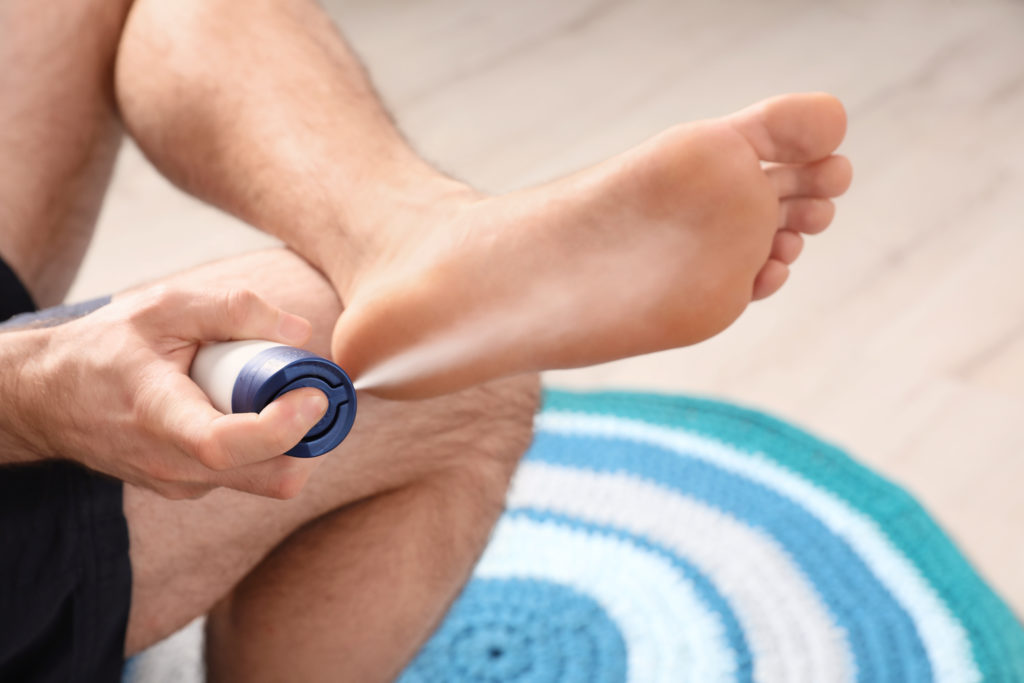Top Dermatology Treatments for Hyperhydrosis of Hands and Feet: What You Need to Know
Top Dermatology Treatments for Hyperhydrosis of Hands and Feet: What You Need to Know
Blog Article
Recognizing the Source of Excessive Sweating and Its Influence on Life
While it is generally understood as a physiological reaction to manage body temperature, the triggers for too much sweating can differ widely amongst people, encompassing not only physical aspects yet likewise emotional and emotional aspects. By delving into the root causes of hyperhidrosis and discovering its diverse effects, a much deeper understanding of this pervasive issue can be gotten, dropping light on the intricacies that individuals grappling with excessive sweating browse on a day-to-day basis.
Physiology of Sweat Glands
The policy of sweat manufacturing, a critical physical procedure, is mostly regulated by the task of sweat glands dispersed across the human body. Sweat glands are categorized right into 2 major types: eccrine and apocrine glands.
When the body temperature level rises, either due to exercise, heats, or emotional stress, the nerve system causes the sweat glands to produce sweat. This sweat is made up largely of water and electrolytes like sodium and chloride. The process of sweat manufacturing is vital for preserving the body's inner temperature within a narrow, optimal variety, highlighting the crucial duty gland play in human physiology.
Triggers for Excessive Sweating
In comprehending the origin triggers of excessive sweating, it is vital to identify the triggers that can lead to this physical reaction. Physical effort, high temperature levels, and spicy foods are likewise known to trigger extreme sweating in individuals vulnerable to this problem.
Additionally, drugs such as some antidepressants, opioids, and certain supplements can likewise serve as triggers for hyperhidrosis. Recognizing these triggers is crucial in handling extreme sweating effectively - Treatment for hyperhydrosis of hands and feet. By recognizing and attending to the certain triggers that prompt excessive sweating in a specific, medical care suppliers can develop customized therapy strategies to minimize this problem and improve the person's high quality of life
Medical Issue Associated
Related to excessive sweating are numerous medical problems that can intensify this physical response. One usual condition is hyperhidrosis, a disorder defined by abnormally enhanced sweating that surpasses the body's thermoregulatory needs. This can materialize in focal areas like the palms, soles, underarms, or face, influencing an individual's quality of life due to social shame and pain.
Furthermore, endocrine conditions such as hyperthyroidism, diabetes, and menopausal hot flashes can additionally bring about too much sweating. Hyperthyroidism causes an overflow of thyroid hormones, accelerating metabolism and activating sweating. Diabetic issues can induce sweating episodes, specifically throughout hypoglycemic episodes when blood sugar level degrees go down also reduced. Menopausal warm flashes, credited to hormone fluctuations during menopause, can cause abrupt and extreme sweating, typically accompanied by flushing and heart palpitations.
Additionally, infections like tuberculosis, HIV, and endocarditis have been linked with night sweats, a typical symptom known to interfere with sleep and impact general well-being. These clinical problems highlight the diverse variety of underlying elements that can add to too much sweating, necessitating thorough assessment and management by healthcare specialists.
Mental and psychological Elements

Influence on Social Communications
Extreme sweating can have extensive effects on a person's ability to engage comfortably in social interactions. The visible signs of sweat stains or damp spots on clothing can lead to shame and self-consciousness, triggering individuals to withdraw from social situations. This withdrawal can impact relationships, limitation social activities, and hinder professional and personal growth.

Moreover, the stress and anxiety and self-esteem problems originating from excessive sweating can influence interaction and visit this web-site interpersonal skills. People might battle to concentrate on conversations, join group tasks, or express themselves confidently. This can lead to feelings of seclusion and solitude, as social connections come to be testing to preserve.
Conclusion

While it is commonly recognized as a physical response to manage body temperature level, the triggers for too much sweating can differ extensively among individuals, incorporating not only physical factors yet likewise psychological and psychological aspects. By delving right into the root creates of hyperhidrosis and exploring its complex impacts, a much deeper understanding of this pervasive problem can be gotten, losing light on the complexities that people grappling with extreme sweating navigate on a daily basis.
Physical exertion, high temperature levels, and spicy foods are likewise known to activate extreme sweating in people vulnerable to this condition. By identifying and dealing with the certain triggers that trigger excessive sweating in an individual, healthcare carriers can establish individualized treatment plans to relieve this condition and enhance the person's high quality of life.
Too much sweating can have extensive effects on an individual's ability to engage conveniently in social interactions.
Report this page